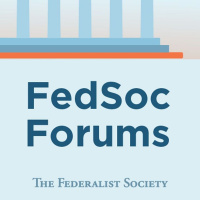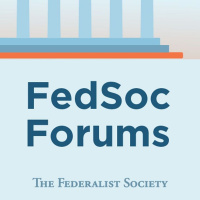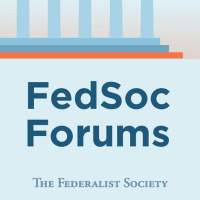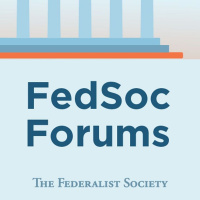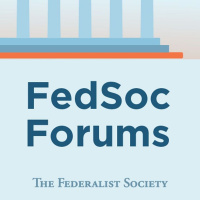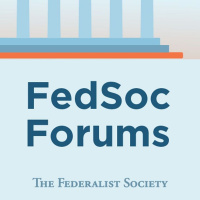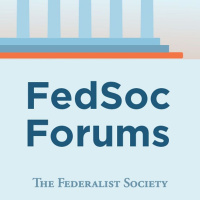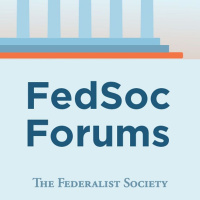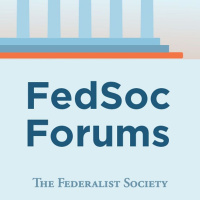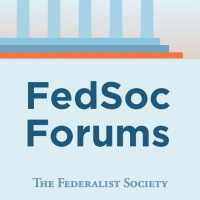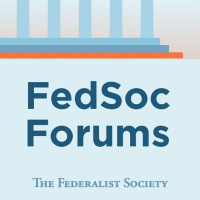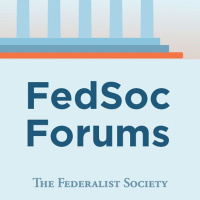Sinopsis
This series of podcasts features experts who analyze the latest developments in the legal and policy world. The podcasts are in the form of monologues, podcast debates or panel discussions and vary in length. The Federalist Society takes no position on particular legal or public policy issues; all expressions of opinion are those of the speakers. We hope these broadcasts, like all of our programming, will serve to stimulate discussion and further exchange regarding important current legal issues.
Episodios
-
Does "Board Law" Matter after Loper Bright?
07/07/2025 Duración: 01h01minAdministrative law is in flux, nowhere more so than at the National Labor Relations Board. The Board has long made labor law (or “policy”) by issuing decisions and applying its own precedent. But in a recent oral argument at the Seventh Circuit, one member of the panel suggested that he didn’t want to hear about “Board law.” The judges, he said, could read the statute for themselves. That statement was controversial and thought-provoking. After last term’s blockbuster decision in Loper Bright Enterprises v. Raimondo, courts are no longer supposed to defer to administrative agencies on legal questions. So does that mean Board law is dead? Or is the issue more complicated? Join our panelists as we dissect the issue.Featuring:Prof. Samuel Estreicher, Dwight D. Opperman Professor of Law Director, Center for Labor and Employment Law Co-Director, Institute of Judicial Administration, NYU School of LawAlexander T. MacDonald, Shareholder & Co-Chair of the Workplace Policy Insti
-
Courthouse Steps Decision: Mahmoud v. Taylor
07/07/2025 Duración: 52minMahmoud v. Taylor concerns the question of whether parents have the right to be notified and opt their children out of classroom lessons on gender and sexuality that violate their religious beliefs.In 2022, the Montgomery County, Maryland, School Board introduced storybooks for pre-K through fifth-grade classrooms covering topics like gender transitions and pride parades. Maryland law and the Board’s own policies provide parents the right to receive notice and opt their kids out of books that violate their religious beliefs. However, when parents attempted to exercise this right, the School Board eliminated notice and opt-outs altogether. In response, a diverse coalition of religious parents, including Muslims, Christians, and Jews, sued the School Board in federal court. The parents argue that storybooks are age-inappropriate, spiritually and emotionally damaging for their kids, and inconsistent with their beliefs.Last year, the Fourth Circuit upheld the School Board’s policy, ruling that the rem
-
Litigation Update: Legal Developments Surrounding Tithing and Religious Donations
02/07/2025 Duración: 01h01minIn recent years, a flurry of lawsuits has been launched nationwide against religious organizations, raising fraud and other claims related to tithing and church donations. These challenges generally argue that church leaders falsely claimed they would only put donations to one use, but instead put them to another. These cases, which have been heard in the 9th, 10th, and D.C. Circuits, as well as multi-district litigation in federal court in Utah, raise church autonomy issues, such as the extent to which religious leaders can determine how to use donations made to the organization. Additionally, at least one of these cases raises the procedural question of whether church autonomy should be treated more like immunity from suit, and allow for interlocutory appeals on church autonomy matters. On this FedSoc forum, Daniel Blomberg and Dr. James C. Phillips will run through several of these cases, discussing these and related issues.Featuring:Daniel Blomberg, Vice President and Senior Counsel, The Becket Fund for R
-
Courthouse Steps Decision: Medina v. Planned Parenthood South Atlantic
30/06/2025 Duración: 37minin July of 2018, Governor Henry McMaster of South Carolina issued an executive order to end the inclusion of Planned Parenthood in the Medicaid program. The Department of Health and Human Services then informed Planned Parenthood that they were no longer qualified to provide services to Medicaid beneficiaries, which prompted lawsuits both from Planned Parenthood and beneficiaries seeking to enforce their right to “free-choice-of-provider,” included in a 1967 Medicaid provision. This case asked whether this provision unambiguously confers a private right upon a Medicaid beneficiary to choose a specific provider. On June 26, 2025, the Court ruled 6–3 in favor of South Carolina, affirming the state's right to exclude abortion providers from its Medicaid program. Tune in to this Courthouse Steps podcast as we break down the case and its recent decision. Featuring: John J. Bursch, Senior Counsel and VP, Appellate Advocacy, Alliance Defending Freedom Kyle Douglas Hawkins, Partner, Leho
-
Courthouse Steps Decision: EPA v. Calumet Shreveport Refining, LLC and Oklahoma v. EPA
26/06/2025 Duración: 41minOn June 18, 2025, the Supreme Court released its decisions for two circuit splits arising under the Clean Air Act (CAA) provision regarding judicial venue: EPA v. Calumet Shreveport Refining, L.L.C. (23-1229), and Oklahoma v. EPA (23-1067). Decided 7-2 and 8-0, respectively, the outcome of these cases hinged on the Court’s interpretation of the CAA’s unique venue provision, 42 U.S.C. § 7607(b)(1). The CAA states that challenges to “nationally applicable” actions may be filed only in the D.C. Circuit. 42 U.S.C. § 7607(b)(1). Conversely, challenges to CAA actions that are “locally or regionally applicable” may generally be filed only in the appropriate circuit court for the region. Id. But there is an exception: actions that are “based on a determination of nationwide scope or effect” must be filed in the D.C. Circuit “if in taking such action the Administrator finds and publishes that such action is based on such a determination.” Id.In Calu
-
Courthouse Steps Decision: United States v. Skrmetti
20/06/2025 Duración: 49minIn the last several years, numerous minors who identify as transgender have undergone surgery and other medical procedures to mirror common physical features of the opposite sex.In March 2023, Tennessee enacted Senate Bill 1, which prohibits medical procedures for the purpose of either (1) enabling a minor to identify with, or live as, a purported identity inconsistent with the minor’s sex, or (2) treating purported discomfort or distress from a discordance between the minor’s sex and asserted identity. Individuals, joined by the United States, brought suit against Tennessee. They alleged that a ban on “gender affirming care” violates the Equal Protection Clause and that the Due Process Clause’s “substantive” component gives parents a right to demand medical interventions for their children, even if a state has found them to be unproven and risky.On June 18th, 2025, the Supreme Court ruled in a 6-3 decision that Tennessee’s law prohibiting certain medical treatm
-
Checks and Balances: Deregulation Based on Supreme Court Rulings
18/06/2025 Duración: 01h05minAmong the points emphasized by the second Trump administration has been a major push for deregulation. President Trump has directed that there must be ten deregulatory actions for every one regulatory one, and put forward Presidential Memoranda and Executive Orders to that end. As some have noted, however, such deregulation can take significant time due to factors like the requirements for notice and comment under the Administrative Procedure Act.Interestingly, an April Presidential Memorandum seems to contemplate that potential hurdle for executive actions directing repeal of regulations contrary to ten specific recent Supreme Court decisions, including without notice and comment “where appropriate.”This panel will seek to discuss the potential impact of this presidential memorandum, when deregulation may happen, incurring a need for notice & comment, and what the Judicial Branch might ultimately determine about the Executive Branch’s efforts to enforce their precedents in this manner.F
-
Courthouse Steps Decision: Kousisis v. United States
18/06/2025 Duración: 38minIn Kousisis v. United States, the Supreme Court considered the question of whether a defendant who induces a victim to enter into a transaction under materially false pretenses may be convicted of federal fraud--even if the defendant did not seek to cause the victim economic loss. It heard oral argument on December 9, 2024, and on May 22, 2025, issued a unanimous decision authored by Justice Barrett affirming the lower court's holding that the defendant could be convicted of federal fraud.Although the Court was unanimous, there are an array of opinions. Justice Thomas filed a concurring opinion, Justice Gorsuch authored an opinion concurring in part and concurring in judgment, and Justice Sotomayor wrote to concur in judgment.Join us for a Courthouse Steps program where we will discuss the decision and the potential ramifications of the case.Featuring:Brandon Moss, Partner, Wiley Rein
-
Courthouse Steps Decision: Smith & Wesson Brands, Inc. v. Estados Unidos Mexicanos
18/06/2025 Duración: 46minIn Smith & Wesson Brands, Inc. v. Estados Unidos Mexicanos, Mexico brought suit against several U.S. gun manufacturers, including Smith & Wesson. It alleged, among other things, that they were in part liable for the killings perpetrated by Mexican cartels. Mexico argued that the gun manufacturers know the guns they sell are/may be illegally sold to the cartels and thus are the proximate causes of the resulting gun violence.The manufacturers argued that they were immune from such suits under the U.S. Protection of Lawful Commerce in Arms Act (PLCAA), which protects U.S. gun manufacturers from certain types of liability, though not universally, as it contains a predicate exception for manufacturers who knowingly violate applicable federal (and potentially international) law.The Supreme Court heard oral arguments on March 4, 2025. On June 5, 2025, the Court issued a unanimous opinion authored by Justice Kagan, ruling that the PLCAA did prevent the suit from moving forward. Justices Thomas and Jackson bot
-
Proxy Plumbing - A Primer for the Coming Policy Debate
18/06/2025 Duración: 55minThe SEC has periodically examined the ecosystem governing public company shareholder communications and voting—the “proxy plumbing ecosystem”—and it is expected that the SEC will again review this area under soon-to-be SEC Chairman Paul Atkins’ leadership. This panel will focus on how the proxy ecosystem works, the organizations that control and maintain the “plumbing” and the roles each participant plays in assuring that shareholders can get their votes executed. Consider this a primer so that when the debate occurs you can follow it, and why some will vociferously seek to maintain the status quo while others will with equal force seek to disrupt it.Featuring:Lawrence Conover, Vice President, Special Advisor for Proxy & Corporate Actions, BroadridgeHon. Troy Paredes, Founder, Paredes Strategies LLCMatthew Thornton, Deputy General Counsel, Investment Company InstituteModerator: Joanne Medero, Former Managing Director, BlackRock Inc.--To register, click the link
-
Antitrust in the College Sports Arena
18/06/2025 Duración: 01h07sIn 2020, several collegiate athletes filed suit against the National Collegiate Athletic Association (NCAA) arguing that by both denying athletes compensation and preventing them from pursuing third-party deals using their names, images, or likenesses (NIL) for profit, the NCAA was violating antitrust laws. After several years of discussion, there has still not been an official settlement reached, though one including back pay, revenue sharing, and a change in NIL rights has been proposed. Join this FedSoc Forum to discuss this case, its possible outcomes, and its implications for collegiate sports and the issue of sports antitrust writ large.Featuring:Prof. Jodi Balsam, Professor of Clinical Law, Brooklyn Law SchoolErik Clark, Ohio Deputy Attorney General for Major Litigation, Ohio Attorney General's OfficeRakesh Kilaru, Partner, Wilkinson Stekloff LLPModerator: Kaitlyn Barry, Associate, Baker McKenzie--To register, click the link above.
-
Regulatory Reform for 5G Deployment: Infrastructure and Policy Perspectives
11/06/2025 Duración: 57minThe ubiquitous deployment of both wireless and wireline technology is critical to 5G and other next generation services. However, lengthy permitting processes, as well as burdensome NEPA and NHPA requirements, continue to slow infrastructure builds. As the Trump Administration continues to prioritize streamlining rules and regulations, as well as promoting access to reliable, affordable broadband internet, all eyes are on the FCC, NTIA, and the Hill to see what may come next. This webinar features Paul Beaudry, Vice President of Regulatory and Government Affairs for Cogeco, Tony Clark, Executive Director of the National Association of Regulatory Utility Commissioners and former Commissioner of the Federal Energy Regulatory Commission, and Caroline Van Wie, Vice President of Federal Regulatory at AT&T. Danielle Thumann, Senior Counsel to FCC Chairman Brendan Carr, will moderate and participate in the discussion.
-
Litigation Update: Bournemouth, Christchurch, and Poole Council v. Livia Tossici -Bolt
11/06/2025 Duración: 57minIn April, Dr. Livia Tossici-Bolt was criminally convicted in a British court for offering consensual conversation in an abortion facility “buffer zone” in Bournemouth, England. The court found that she violated a Public Spaces Protection Order that prohibits “engaging in an act of approval or disapproval with regard to abortion services,” despite holding a sign that simply read: “Here to talk if you want." The U.S. State Department issued a statement of concern about her case and the decline of freedom of expression in the United Kingdom. Dr. Tossici-Bolt's conviction is the latest in a string of cases targeting thought and peaceful speech. In October 2024, the same court convicted Adam Smith-Connor for silent prayer in a "buffer zone.” U.S. Vice President JD Vance highlighted his case at the Munich Security Conference.Featuring: Paul Coleman, Executive Director, ADF InternationalModerator: Prof. Maimon Schwarzschild, Professor of Law, University of San Diego School of Law
-
Fireside Chat with Ambassador Kay Bailey Hutchison
11/06/2025 Duración: 39minAmbassador Kay Bailey Hutchison served as the U.S. Ambassador to NATO from 2017-2021. From 1993-2013, she represented Texas in the U.S. Senate. Join us for a conversation about her life and career.Featuring: Hon. Kay Bailey Hutchison, Former U.S. Ambassador to NATO; Former U.S. Senator, TexasModerator: Nitin Nainani, Judicial Law Clerk, U.S. District Court for the Southern District of Florida
-
Digital Assets Market Structure Reform
11/06/2025 Duración: 01h01minReforming the regulation of digital assets is a pressing issue across Congress, the Administration, the SEC, and the CFTC, profoundly impacting the expanding digital assets industry. Join the Federalist Society for a timely webinar delving into the complexities of digital assets market structure reform. Patrick Daugherty, who leads a prominent digital assets practice and teaches the subject at leading law schools, will moderate a distinguished panel of experts. The discussion will feature Miles Jennings, Head of Policy & General Counsel at a16z Crypto; Lee Schneider, General Counsel of Ava Labs; Justin Wales, Head of Legal for the Americas at Crypto.com; and Steve Lofchie, a Wall Street lawyer and author of the authoritative Lofchie’s Guide to Broker-Dealer Regulation.
-
Emerging Issues in the Use of Generative AI: Ethics, Sanctions, and Beyond
11/06/2025 Duración: 01h03minThe idea of Artificial Intelligence has long presented potential challenges in the legal realm, and as AI tools become more broadly available and widely used, those potential hurdles are becoming ever more salient for lawyers in their day-to-day operations. Questions abound, from what potential risks of bias and error may exist in using an AI tool, to the challenges related to professional responsibility as traditionally understood, to the risks large language learning models pose to client confidentiality. Some contend that AI is a must-use, as it opens the door to faster, more efficient legal research that could equip lawyers to serve their clients more effectively. Others reject the use of AI, arguing that the risks of use and the work required to check the output it gives exceed its potential benefit.Join us for a FedSoc Forum exploring the ethical and legal implications of artificial intelligence in the practice of law. Featuring: Laurin H. Mills, Member, Werther & Mills, LLCPhilip A. Sechler, Senior
-
Courthouse Steps Decision: Catholic Charities Bureau, Inc. v. Wisconsin Labor & Industry Review Commission
10/06/2025 Duración: 21minWisconsin’s unemployment insurance program provides financial assistance to those who have lost their job through no fault of their own. Under state law, certain nonprofit organizations can opt out of the program, including those operated primarily for religious purposes. Catholic Charities of the Diocese of Superior—a religious ministry that serves people with disabilities, the elderly, and the impoverished—requested an exemption from the state’s program so that it could enroll in the Wisconsin Bishops’ Church Unemployment Pay Program (CUPP), which provides the same level of unemployment benefits.Last year, the Wisconsin Supreme Court ruled that Catholic Charities could not receive an exemption because its charitable work was not “typical” religious activity. The court said that Catholic Charities could only qualify for an exemption if, for example, it limited its hiring to Catholics and tried to convert those it served. On June 5th, 2025, the United States Supreme C
-
Courthouse Steps Decision: Ames v. Ohio Department of Youth Services
10/06/2025 Duración: 40minMarlean Ames, a straight woman, was denied promotion and later demoted in her role at the Ohio Department of Youth Services by her lesbian supervisor. The position she sought and her former position were then given to a lesbian woman and a gay man, respectively. This prompted Ames to file suit under Title VII of the Civil Rights Act of 1964, arguing that she was unlawfully discriminated against based on her sexual orientation because she is heterosexual. The Sixth Circuit Court of Appeals affirmed the district court in holding that, because Ames was part of the majority group, she had the additional requirement of demonstrating the "background circumstances" that the employer discriminates against majority group members.On June 5, 2025, the United States Supreme Court unanimously vacated and remanded, holding that “the Sixth Circuit’s ‘background circumstances’ rule—which requires members of a majority group to satisfy a heightened evidentiary standard to prevail on a Title VII c
-
Litigation Update: S.E. v. Grey
10/06/2025 Duración: 58minEncinitas Unified School District required two fifth-grade boys and their assigned kindergarten buddies to read and watch My Shadow is Pink and do an activity, pressuring the kindergartners to choose a color to represent their own shadows. The plaintiffs allege this was designed to make the students question their gender identity. Represented by First Liberty Institute and the National Center for Law and Policy, the families filed a complaint in the Southern District of California and sought a motion for preliminary injunction. On May 12, 2025, Judge M. James Lorenz granted that motion in part, requiring the school district to provide advance notice and opt-outs when gender identity material is taught in mentoring programs. The judge’s opinion focused on compelled speech, finding that the plaintiffs were likely to succeed on the merits of that claim.Free speech expert Professor Eugene Volokh and counsel Kayla Toney, who represents the families, will break down the opinion and discuss its ramifications f
-
Litigation Update: Deemar v. Evanston/Skokie School District 65
10/06/2025 Duración: 37minIt is widely known that schools have instituted equity-focused policies, teacher training, and curriculum. Critics wonder whether this focus on equity is illegal and unconstitutional.Deemar v. District 65 (Evanston/Skokie) involves Dr. Stacy Deemar, a drama teacher in Evanston/Skokie School District 65 in Illinois. She has challenged the District’s allegedly racially charged environment and practice of segregating students and staff. In January 2021, the Department of Education’s Office of Civil Rights (OCR) determined that the District violated Title VI of the Civil Rights Act. But soon after President Biden took office, OCR withdrew that finding without explanation. Dr. Deemar filed a federal lawsuit and, in April 2025, submitted a new complaint to OCR.Featuring:Kimberly Hermann, Executive Director, Southeastern Legal Foundation

